Watching the sunsets, private emotions
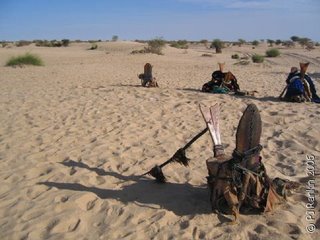 Morning breaks on the daily problem of finding 4 camels, which may by now be 5km or more away after their night of browsing. The less the vegetation, the further away they will be. I'm still amazed how the Tuareg do this. They say they follow the footprints of the oldest or slowest camel - and true, sometimes they hobble one to hop around on 3 legs all night, which tends to reduce their range. I guess if you are a cameleer, you quickly develop extremely good eyesight to spot sandy-coloured camels far off in the sandscape and learn how to differentiate your camels' footprints from everyone else's otherwise you'll have a very long walk. Once one is found, things get a bit easier, with an elevated viewing platform from which to spy and ride to collect the others. Miraculously, it never seems to be more than an hour before Al Hadana appears back at our camp leading four roped camels.
Morning breaks on the daily problem of finding 4 camels, which may by now be 5km or more away after their night of browsing. The less the vegetation, the further away they will be. I'm still amazed how the Tuareg do this. They say they follow the footprints of the oldest or slowest camel - and true, sometimes they hobble one to hop around on 3 legs all night, which tends to reduce their range. I guess if you are a cameleer, you quickly develop extremely good eyesight to spot sandy-coloured camels far off in the sandscape and learn how to differentiate your camels' footprints from everyone else's otherwise you'll have a very long walk. Once one is found, things get a bit easier, with an elevated viewing platform from which to spy and ride to collect the others. Miraculously, it never seems to be more than an hour before Al Hadana appears back at our camp leading four roped camels.Mounting up with an abrupt backward and forward jerk as my camel unfolds itself, we ride off together balancing on the hump-top saddles, watching that pots, blankets or luggage don't work lose from their ropes and get left behind. Each rock of the camel you have to nudge the beast onward with your feet, the bottom curve of its strong coarse-haired neck caught between the toes of your crossed legs.
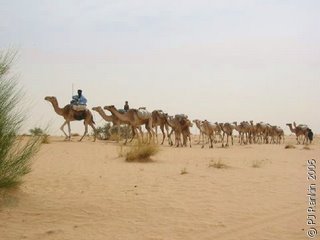 There's an enormous difference between the camels in a caravan, that plod on tied nose to tail carrying the heavy salt slabs like carriages of a long goods train, and the responsiveness of a racing camel to the slightest movement of the reins. The rather old big camel I've been assigned is a constant-speed plodder. Very well behaved, but no amount of foot-nudging will get it out of second gear!
There's an enormous difference between the camels in a caravan, that plod on tied nose to tail carrying the heavy salt slabs like carriages of a long goods train, and the responsiveness of a racing camel to the slightest movement of the reins. The rather old big camel I've been assigned is a constant-speed plodder. Very well behaved, but no amount of foot-nudging will get it out of second gear!
Our stop for the night is at Mohamedune's scattered encampment. It's set by a beautiful golden sand dune, from which you can see the mountains in the distance near Essakane to which we have been heading all day, but which seem just as distant. Mohamedune has been away for many days, but it's not done for Tuaregs to publicly show emotions. Later on when we are settled in our own camp at a discreet separation, he'll go and greet his wife and their small children. 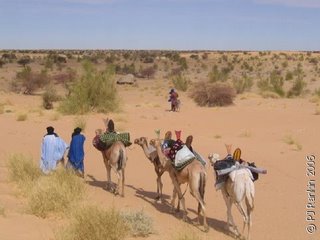
Tuareg men and women lead quite separate lives with different friends. Men are often away from their camp for several weeks. The women stay to look after the children and their animals. Male strangers are not allowed to visit the camp while the menfolk are away. Women therefore have quite a limited social circle except at big clan gatherings or festivals, for instance when celebrating a birth or marriage. However the code in traditional Tuareg society seems much stricter for the men than the women: honour, bravery, trust, respect for women and religious devotion.
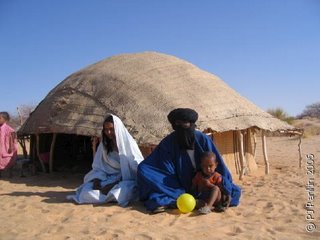 Later we meet Mohamedune's family and his pretty wife cooks a big spagetti bowl for us. (Men only cook when they are travelling.)
Later we meet Mohamedune's family and his pretty wife cooks a big spagetti bowl for us. (Men only cook when they are travelling.)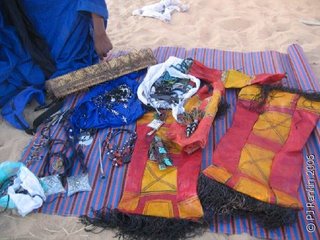 He's proud to show us the fine silver jewelry and ornamental leather work they produce to sell during the short 3-month Timbuktu tourist season.
He's proud to show us the fine silver jewelry and ornamental leather work they produce to sell during the short 3-month Timbuktu tourist season.
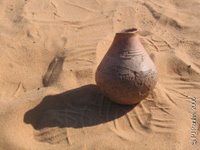 Once the land the Sahara sands have covered was fertile, with trees, lakes and wild life in abundance, supporting many people as shown in the rock art. Often sea shells or pottery shards from ancient settlements can be found in the dunes. Mohamedune says that sometimes if you are very, very lucky the old pots they find like this might contain treasure - or perhaps a Djinni ?
Once the land the Sahara sands have covered was fertile, with trees, lakes and wild life in abundance, supporting many people as shown in the rock art. Often sea shells or pottery shards from ancient settlements can be found in the dunes. Mohamedune says that sometimes if you are very, very lucky the old pots they find like this might contain treasure - or perhaps a Djinni ?
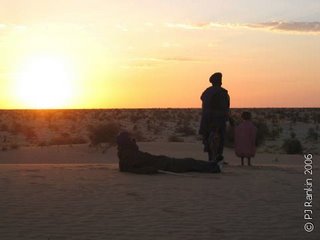 After Moslim prayer prostration on the top of the golden sand dune, silent figures watch the last light of the day. Mohamedune stands, hand-in-hand with his little daughter in a pink coat as big as she is - private time at peace together... Sunset reflections.
After Moslim prayer prostration on the top of the golden sand dune, silent figures watch the last light of the day. Mohamedune stands, hand-in-hand with his little daughter in a pink coat as big as she is - private time at peace together... Sunset reflections.
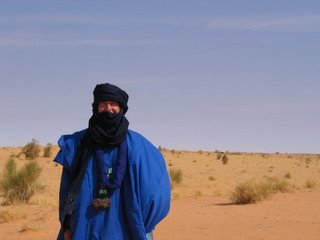


0 Comments:
Post a Comment
<< Home